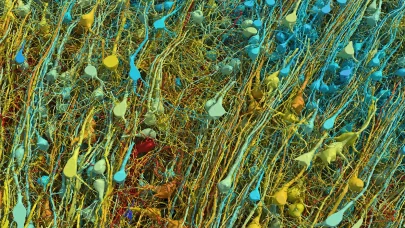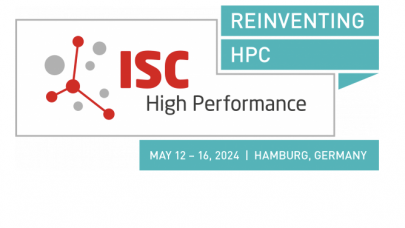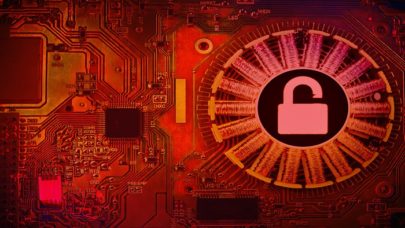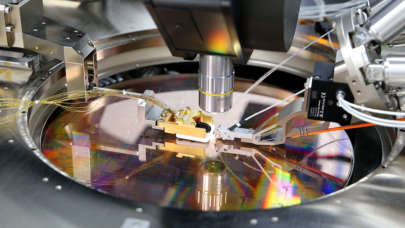September 25, 2019 — It’s a cold truth about quantum computing: To operate, the leading types of processing units that could lie at the heart of quantum computers must be maintained below a chilling 15 millikelvins, or minus 459 degrees Fahrenheit, close to absolute zero. And to be useful, the electronics that process and read the data have to be nearly as cold.
Leaders in quantum science converged this summer at Fermilab for the world’s first workshop on cryogenic electronics for quantum systems. As these fields are highly competitive, the hosts worked hard to attract key global allies and leaders in the field.
Scientists and engineers from academia and industry discussed the challenges of designing electronics for processors and sensors that will work in the ultracold environment.
It’s a fundamental problem facing the field of quantum computing, which holds immense possibility across multiple disciplines. Experts say that quantum computers could someday be powerful enough to solve problems that are impossible for classical computers, potentially redefining how we see the world.
And much of it rides on designing electronics that are up to the task.
“Quantum systems won’t exist without cryogenic electronics,” said Fermilab engineer Farah Fahim, workshop co-organizer and deputy head of quantum science at Fermilab. “That’s why our community needs to collaborate, and why we’re working to establish key partnerships with academia and industry, as well as manufacturing companies that would support the fabrication of cold chips.”
Researchers across multiple sectors have called for collaboration, and pioneers in the field turned out for the meeting. They included Edoardo Charbon (also workshop co-organizer) of the Advanced Quantum Architecture Lab at the Swiss Federal Institute of Technology Lausanne, or EPFL, in Switzerland and Andrew Dzurak of the University of New South Wales and Australia, a trailblazer in the field of silicon-based qubits who gave the workshop’s keynote address. Representatives from IBM, Intel, Global Foundries, Google and Microsoft also attended.
“The Fermilab cryoelectronics workshop is a very important first step for the quantum computing community,” said Malcolm Carroll, research staff member at IBM Research. “Developing supporting electronics for future quantum computers is one of the next big hurdles. IBM looks forward to this series continuing and contributing to it as it has for this first one.”
The global cooling effort centers on accommodating the qubit — the fundamental unit of a quantum computer’s processor. Qubit information needs the extreme cold to survive — below 15 millikelvins — since any thermal energy can disturb the quantum computing operation.
“The core of any quantum-technology-based system is a very special and carefully designed electronics optimized for deep cryogenic temperatures. This is a brave new world for us electronics engineers.”
Current state-of-the-art systems use tens of qubits. But a quantum computer that surpasses the capabilities of today’s classical computer would in certain cases require millions or billions of qubits, each of which needs electronics, both to control the state of the qubit and to read out its signals.
And electronics means cables.
“As the system scales up, one bottleneck has been getting information out of the qubits and controlling the qubits themselves,” Fahim said. “It requires large numbers of wires.”
For larger systems, the qubits and the electronics need to be closely integrated. Otherwise, information can become degraded as it winds its way down lengthy wires to bulky systems. With tight integration, the electronics can deliver the fast, self-correcting feedback required to control the qubit state — on the order of ten-billionths of a second.
When you have the number of wires and cables required for a million- or billion-qubit system, close integration isn’t possible unless your electronics can operate in the cold, side-by-side with the qubit.
Fermilab engineer Farah Fahim, left, and Edoardo Charbon of the Advanced Quantum Architecture Lab at EPFL co-organized the world’s first workshop on cryogenic electronics for quantum systems. Photo: Davide Braga
“When you have lots of cables, after some point, you can’t expand in that direction anymore. You can’t integrate a million cold qubits with warm electronics,” Fahim said. “To scale up, cryogenic electronics is the only way to go. To be able to take it to the next level of integration, we need to move the room temperature control to cryogenic control. You want to be able to change the technology to meet the requirements.”
When the electronics live in the same space — the same refrigerated space — as the qubits, the system becomes practical and manageable, capable of providing accurate, real-time qubit control.
That is the challenge the workshop attendees took head-on: developing quantum-system electronics that don’t mind being left in the cold.
“Developments in cold electronics may hold the keys to scaling up quantum computing,” said Microsoft Quantum – Sydney Director David Reilly, also a professor at the University of Sydney. “As the community moves from the demonstration of single-qubit prototypes to scaled up machines that can address real problems, interest in this field is really taking off. Fermilab has deep expertise in cold electronics as well as a culture of filling the gap between academia and industry. It’s only fitting that the first workshop on this topic was at Fermilab — and I expect to see many more as government labs become pivotal players in the quantum ecosystem.”
Experts dream of a day when quantum computers can get out of the cold and sit comfortably atop your desk just like your current PC.
“We would like to reach a stage where nothing is cryocooled, but until we get there, the only way we get there is with electronics operating at very low temperatures,” Fahim said.
The workshop was a major, international step in that direction.
“Quantum technologies are the next frontier for many fields, including electronics. While quantum computers are certainly the pinnacle of such worldwide effort, many other applications are emerging, like quantum imaging, quantum sensing, quantum communications, quantum metrology, to name just a few,” Charbon said. “But the core of any quantum-technology-based system is a very special and carefully designed electronics optimized for deep cryogenic temperatures. This is a brave new world for us electronics engineers.”
To continue the dialogue on this key enabling technology, the second International Workshop on Cryogenic Electronics for Quantum Systems will be held in Neuchatel, Switzerland in 2020.
This work is supported by the DOE Office of Science.
Learn more about quantum science efforts at Fermilab.
About Fermilab
Fermilab is a member of the IBM Q Hub at the Oak Ridge National Laboratory and part of joint research with the IBM Q Network in the context of the Chicago Quantum Exchange
Source: Leah Hesla, Fermilab



























































